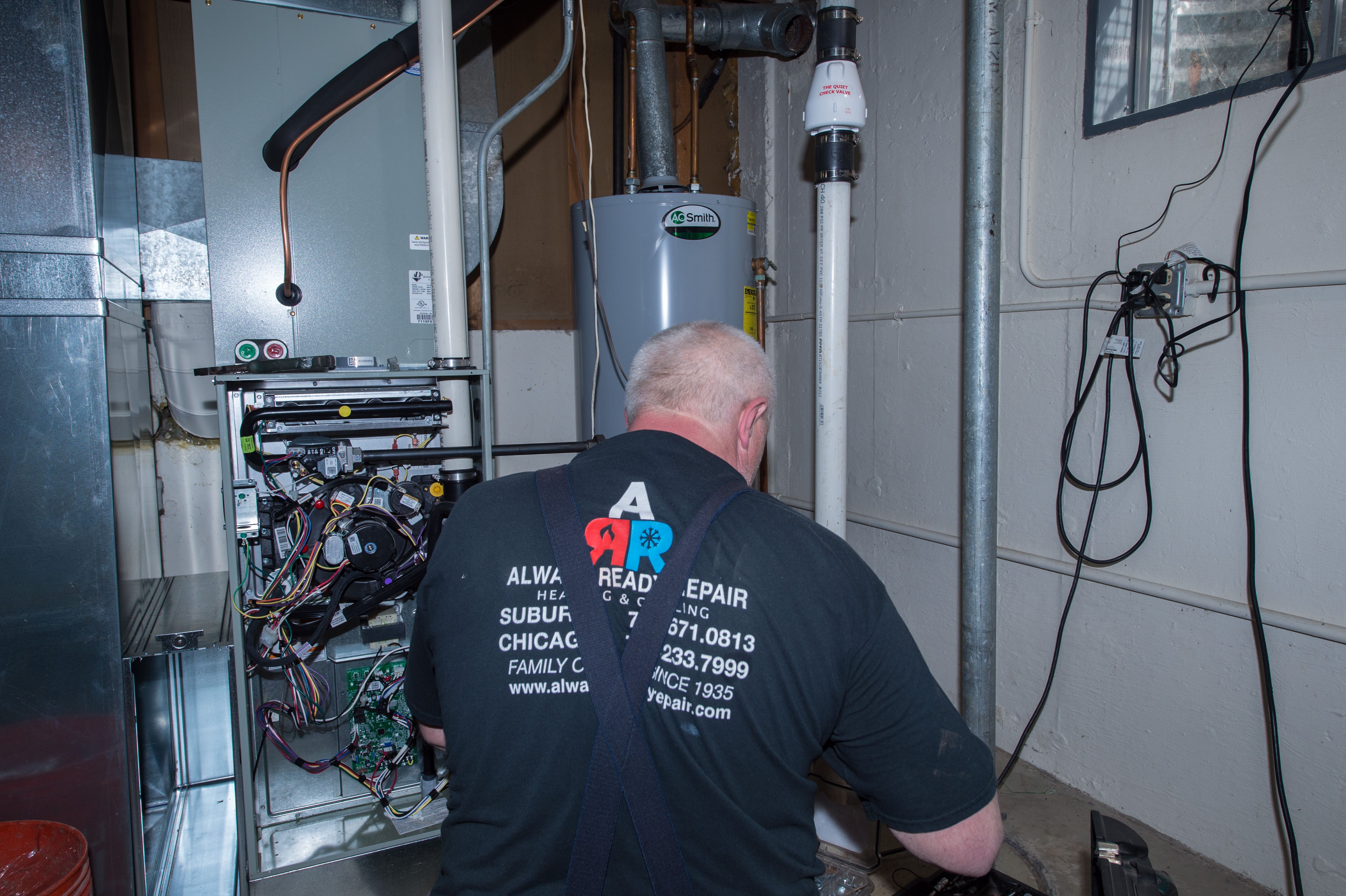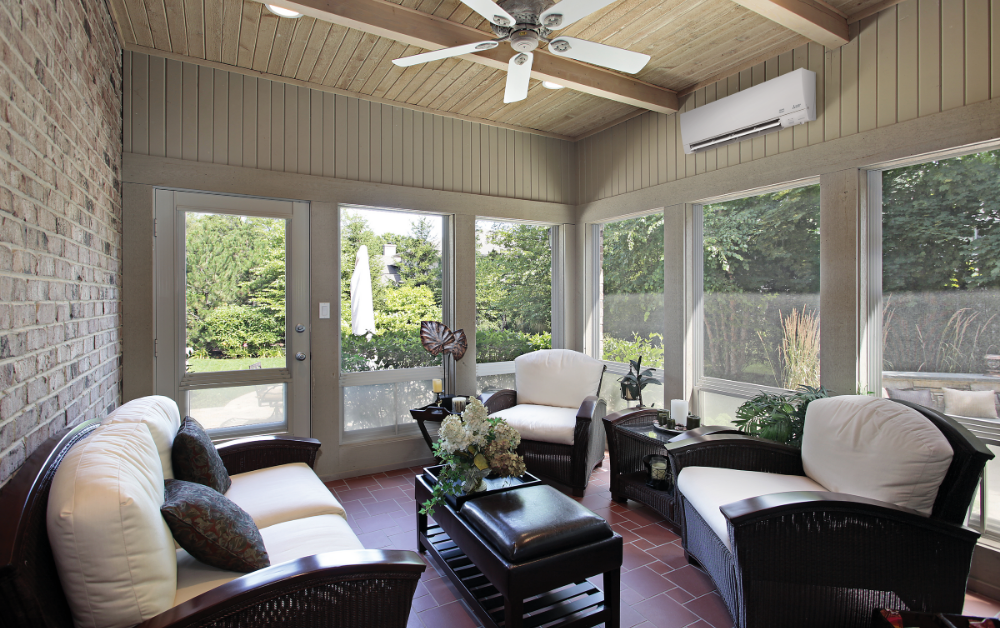Understanding Indoor Air Quality and Allergies
Poor indoor air quality can exacerbate allergy symptoms and pose significant health risks. Common allergens such as pollen, dust mites, mold spores, pet dander, and volatile organic compounds (VOCs) circulate through the indoor environment, especially during spring months when outdoor air pollution also tends to peak. VOCs are particularly concerning, as they originate from everyday household products like paints, cleaning supplies, and adhesives. For allergy sufferers, exposure to these contaminants can mean more severe symptoms and prolonged discomfort due to poor indoor air.
Your furnace and air conditioning units play a significant role in maintaining clean indoor air. When properly maintained, these heating and cooling systems ensure optimal air flow, filter out allergens, and circulate fresh air throughout your home, significantly reducing allergy triggers.
How Your HVAC System Can Reduce Allergens
Regularly Replace Air Filters

One of the simplest yet most effective ways to combat spring allergies is regularly replacing your HVAC air filters. High-quality air filters capture a significant percentage of airborne particles, including pollen, dust, and VOCs. For optimal allergy relief, choose filters with a higher MERV rating (Minimum Efficiency Reporting Value), ideally between 8 and 13, which trap smaller allergenic particles.
In the Chicago suburbs, where pollen counts spike dramatically in spring, homeowners should replace filters at least every 30 to 60 days during peak allergy season.
Consider an Air Purification System
Adding an air purification system to your HVAC setup can further enhance indoor air quality. Air purifiers use advanced filtration technology to remove microscopic allergens that traditional HVAC filters might miss. Many modern systems effectively neutralize pollen, dust mites, mold spores, VOCs, and even bacteria and viruses, providing comprehensive allergy relief.
Schedule Regular HVAC Maintenance
Routine HVAC maintenance ensures your system operates efficiently, improving both indoor air quality and energy efficiency. Professional HVAC technicians will clean and inspect components, removing dust and mold buildup from critical areas like ductwork, coils, and fans. Regular maintenance helps your system maintain proper air flow, effectively reducing allergens and improving overall comfort.
In the Chicago suburbs, where weather fluctuations are common, regular HVAC check-ups are essential for maintaining consistent indoor air quality and avoiding unexpected breakdowns.
Control Indoor Humidity
Humidity plays a significant role in indoor air quality. Excess moisture encourages mold growth and attracts dust mites, both of which exacerbate allergy symptoms. Your HVAC system can help maintain ideal humidity levels between 30% and 50%, significantly reducing these allergenic risks.
Consider installing a whole-home dehumidifier to work alongside your HVAC system, particularly if your home struggles with persistent moisture or humidity issues.
Inspect and Seal Your Ductwork
Leaky ductwork can reduce your HVAC system's efficiency and allow allergens and pollutants from unconditioned spaces (like attics or basements) to enter your home's air circulation. Professional duct inspection and sealing can significantly improve indoor air quality and HVAC performance.
Optimize Air Flow
Ensuring proper air flow is critical for maintaining good indoor air quality. Blocked or restricted airflow can lead to areas of stagnant air where allergens accumulate. Make sure vents and registers are clear of furniture, curtains, and other obstructions. Adjusting your home's vents to evenly distribute air throughout each room can also help prevent the buildup of allergens.
Practical Tips for Allergy Relief Using Your HVAC System
Here are some easy-to-follow tips to maximize your HVAC system's ability to reduce allergens in your home:
- Keep windows and doors closed: During high pollen days, rely on your air conditioners instead of opening windows to cool your home.
- Adjust humidity levels: Keep indoor humidity between 30% and 50%. Mold and dust mites thrive in higher humidity, worsening allergy symptoms.
- Clean your vents and registers regularly: Dust accumulation on vents and registers can reintroduce allergens into your living space.
- Vacuum and dust frequently: Regular cleaning helps minimize allergens that your HVAC system might otherwise circulate.
- Use exhaust fans in kitchens and bathrooms: This reduces humidity and minimizes the growth of mold spores.
- Invest in houseplants: Certain houseplants, like snake plants and peace lilies, naturally remove VOCs from the air, complementing your HVAC system’s efforts.
- Limit the use of VOC-producing products: Choose natural or low-VOC household products to reduce indoor air contaminants.
- Monitor outdoor air quality reports: Stay informed about local pollen counts and air quality forecasts so you can proactively adjust your home's ventilation.
Frequently Asked Questions About Spring Allergies and HVAC Systems
1. How often should I change my HVAC air filter during allergy season?
Replace your filter every 30 to 60 days during spring, especially if you or your family members suffer from allergies.
2. Can my HVAC system completely eliminate allergens from my home?
While no system can remove 100% of allergens, a well-maintained HVAC system combined with air purification can significantly reduce indoor allergen levels.
3. Are high-MERV filters always better for allergies?
High-MERV filters are more effective at trapping small particles, but they can reduce airflow and strain older HVAC systems. Consult an HVAC professional to determine the best balance for your system.
4. Does HVAC maintenance help with allergies?
Yes, regular HVAC maintenance ensures your system efficiently removes allergens and maintains optimal indoor air quality.
5. Should I install an air purifier if I already have an HVAC system?
Adding an air purifier can greatly enhance your HVAC system’s ability to eliminate allergens, offering additional relief during allergy season.
For More Information
Combat Allergies Today—Contact Your Local HVAC Experts!
If you're tired of spring allergies affecting your family's comfort, it's time to give your HVAC system some attention. Our professional HVAC technicians are ready to help homeowners throughout the Chicago suburbs improve indoor air quality, enhance energy efficiency, and enjoy allergy-free comfort this spring.
Contact us today to schedule your HVAC maintenance or discuss air purification solutions tailored to your needs!







).png)










